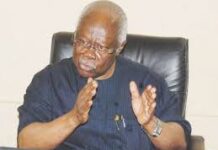Imposition as Consensus: A Time Bomb that May Consume APC By Hashim Suleiman
POLITICS DIGEST- Some people believe Nigerians are bad students of history. Some say Nigerians don’t learn from history and anyone or group of people who don’t learn from history are bound to repeat past mistakes which can have catastrophic consequences.
The All Progressives Congress (APC) is a typical example of this as they have from day one tried as much as possible to repeat all the past mistakes of the Peoples Democratic Party (PDP).
We have just come out from the conduct of the national convention of the ruling party where attempts at imposition in the name of consensus almost tore the party apart. The party was saved by the respect the governors and other party faithful have for President Muhammadu Buhari. And that respect is one thing that has been sustaining the party up till today. But for how long? The powers that be may not be as lucky if a similar attempt is made to impose a presidential candidate on everyone.
This matter needs to be echoed because it is evident that the managers of the party or rather the managers of President Buhari have become totally comfortable and complacent over how easily Buhari’s instructions are heeded regarding consensus and imposition. Their inertia is deep enough not to even let them see the little trembling that resulted from the consensus processes leading to the selection of the National Working Committee of the party. From the President cutting short his foreign trip to letters and counter letters as well as claims and counterclaims on TV, there were, and still are, warning signs that the APC must tread carefully this time
Read Also:
While some members of the PDP who have learnt lessons from the past are insisting on an open contest to clinch party tickets, lazy folks in the APC are looking to get party nominations by imposition. These people must be resisted for the sake of Nigeria’s democracy. Once the major fabrics of democracy which are the political parties are destroyed, what are we going to have left again? This will only take the clock backwards to pre-1999 when all the work about building a formidable democracy will have to be started again. That was why the National Assembly in its wisdom initially submitted an amended electoral act containing only direct primaries as a means of nomination of candidates by political parties. However, as usual, those lazy politicians who would always want to use privileges to advance their selfish agenda worked to truncate such provisions by ensuring that their most potent tools of indirect primaries and consensus were added.
That thing that is most dangerous with all the talk of consensus is that it has even permeated our everyday life. People have no regard for merit, competence and competition anymore, everyone wants to create shortcuts or have their way out of everything. From workplaces to business environments and voluntary unions and associations, you will always see how people mobilise towards truncating any competitive process using their privileged positions and because most of the people at the helm also emerged through same shortcuts.
The 2023 elections are fast approaching and the majority of the candidates from all the parties just want to be endorsed and affirmed. They are busy rallying around principals and waiting for endorsements while all others who have worked all their lives to gather enough goodwill as a competitive edge must be jettisoned and schemed out. This can never be good for democracy, thankfully though, the National Assembly has introduced a caveat to consensus by saying all candidates must put in writing their acceptance to the consensus arrangement. One could say this is a little deviation from total imposition but we can do better.
Finally, this is an advisory to all contestants and political parties to recognise that we must stop the culture of imposition before it kills us as a people. The culture of hard work and competition is daily giving way for these shortcuts and we must work to put an end to them for the sake of the survival of our democracy.
Hashim Suleiman
[email protected]

















